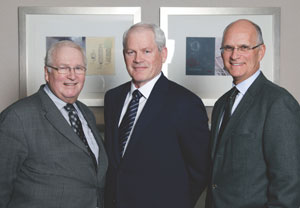Bereskin & Parr LLP is growing with its announcement today that Donald MacOdrum of McMillan LLP will be merging his practice with the firm, a move that follows a similar action by lawyers at intellectual property boutique Cameron MacKendrick LLP.

“In one respect, I regret leaving Lang Michener and later McMillan because I have so many friends there and it’s such a great group of people,” says MacOdrum, a former partner at McMillan. “But on the other hand, I’m looking forward to the challenge and I am very excited.”
MacOdrum says he made the decision to merge his practice with Bereskin & Parr following Lang Michener’s merger with McMillan last year. The deal meant MacOdrum was older than McMillan’s age-based retirement policy allowed.
“I wasn’t quite ready to stop yet. I think this is going to be very exciting. I have a very high regard for them and I think it’ll be fun for the four of us to build an even better team,” he says, referencing the lawyers from Cameron MacKendrick who have also joined Bereskin & Parr.
Partners Donald Cameron and Scott MacKendrick merged their practices with the firm earlier this month along with colleague Christina Settimi.
MacOdrum will join the pair on the firm’s litigation team in Toronto. “We’ve been able to bring to Bereskin & Parr two of the most experienced IP litigators in Canada,” says Philip Mendes da Costa, chairman of the firm’s executive committee.
“With the addition of partner Don MacOdrum, it will give us one of the largest depths of intellectual property experience in Canada. We’re very happy, and I know Don, Scott, and now Don MacOdrum are as well." Mendes da Costa calls the move a “natural fit.”
“When this started out, we wanted to increase the strength and depth of our litigation group, and I happened to be at a function where MacKendrick said they were looking to bring their practice into a larger firm, so really it was just a natural fit.”
Mendes da Costa adds he hopes the move will attract high-profile intellectual property cases to the firm, a sentiment Cameron echoes.
“We were looking for a bigger firm and felt we were missing out on some of the bigger files because we were so small at the time,” says Cameron. “Sometimes, perception becomes reality, and so we began looking for a bigger platform and more opportunities for litigation.”
For his part, MacKendrick says the complementary nature of the firms has made for a smooth transition.
“We saw there was very much a complementary fit between us, both from a client basis and a skill-set basis,” he says. “It was thought that if we came together, we would form quite a formidable IP litigation team.”
Bereskin & Parr isn’t the only firm making changes this month. In a formal merger, Macleod Dixon LLP joined with Norton Rose OR LLP to create Norton Rose Canada. The move followed Ogilvy Renault LLP’s high-profile move to join the global Norton Rose Group.
“The merger was very client-driven in the sense that we wanted to grow opportunities for our clients both in Canada and internationally as well,” says Bill Tuer, Macleod Dixon’s managing partner in Calgary who now becomes an integration partner at Norton Rose Canada. “Norton Rose Canada allows us to do that.”
Traditionally, Ogilvys hadn’t made such bold moves. It took a long time to open a practice in Toronto and had only recently started up an office in Calgary.
But the Norton Rose Group appears to have a knack for spotting opportunities, says John Coleman, managing partner of Norton Rose Canada.
“It was an evolution of similar goals in the sense that Norton Rose’s six key sectors . . . including mining and energy . . . are sectors that Macleod is extremely powerful in, both on the oil-and-gas side and the mining side. It’s almost like a marriage made in heaven.”
Coleman will head Norton Rose Canada with the support of a global executive committee. For now, committee members include Coleman, Tuer, and Norton Rose senior partner Michael Lang.
“From a practice perspective, the six key factors will still be pursued, but as we bring ourselves together under this unfolding process of change, we’ll be building a new type of Canadian firm,” says Coleman.
In the meantime, Norton Rose could be setting its sights south of the border. “There’s no doubt that to be a truly global firm, we’ll have to look at all our options, including the U.S.,” says Coleman. “I anticipate that could happen in the next two to three years.”
If so, the merger this month may signal a broader shift, says legal historian Christopher Moore. “Of course, given the merger with Norton Rose and the fact that most of the key Canadian corporate decisions could be heading elsewhere, Ogilvy and Norton Rose may signify a larger shift,” he says.
“But it remains to be seen whether there’ll be more complex mergers in the future because of it.”
For more, see
"Energy, resources key in Norton Rose-Macleod Dixon deal."

 “In one respect, I regret leaving Lang Michener and later McMillan because I have so many friends there and it’s such a great group of people,” says MacOdrum, a former partner at McMillan. “But on the other hand, I’m looking forward to the challenge and I am very excited.”
“In one respect, I regret leaving Lang Michener and later McMillan because I have so many friends there and it’s such a great group of people,” says MacOdrum, a former partner at McMillan. “But on the other hand, I’m looking forward to the challenge and I am very excited.”